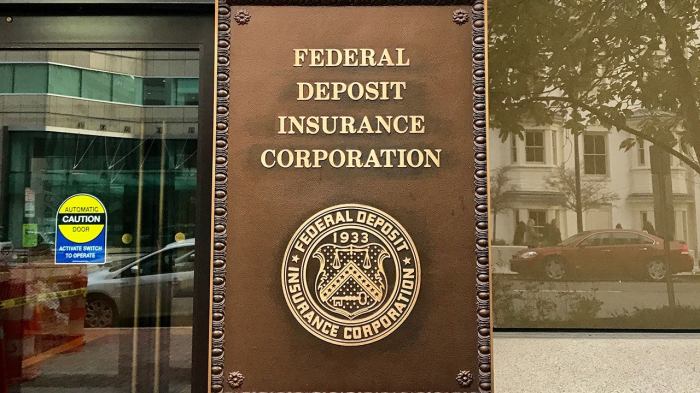Is Capital One CD FDIC insured? That’s the burning question, and we’re here to extinguish any doubts. Understanding FDIC insurance is crucial for any financial product, especially CDs. This isn’t your grandma’s boring finance lesson; we’re going deep into the nitty-gritty, from the history of the FDIC to the specific details of Capital One CDs. Get ready to uncover the truth behind this financial puzzle!
This comprehensive guide explores the world of FDIC insurance, focusing specifically on Capital One CDs. We’ll break down the FDIC’s role, the characteristics of Capital One CDs, and the crucial question of their insured status. Prepare to navigate the complexities of the financial system, with our easy-to-understand explanations and insightful comparisons. We’ll also explore alternative investment options and the risks associated with them.
This is more than just a question; it’s a journey into the heart of your financial security.
Understanding FDIC Insurance

Source: thestockdork.com
The Federal Deposit Insurance Corporation (FDIC) plays a crucial role in safeguarding depositors’ funds within the US financial system. Its presence instills confidence in the banking sector, promoting stability and encouraging public trust.
Purpose of the FDIC
The FDIC’s primary function is to protect depositors’ money in insured banks and savings associations. This insurance mechanism mitigates the risk of financial loss should a bank fail, ensuring depositors can retrieve their funds up to a certain limit.
History and Role in the Financial System

Source: bankrate.com
Established in 1933 in response to the Great Depression, the FDIC was created to restore public confidence in the banking system. Its role evolved to encompass various aspects of banking supervision and regulation, including the examination of member banks to maintain financial stability.
Knowing if your Capital One CD is FDIC insured is crucial. But, if you’re facing a significant settlement from an insurance claim, exploring options like selling structured insurance settlements might offer a more secure and potentially lucrative path forward. Sell structured insurance settlements can provide a steady stream of income, ensuring your financial future is protected, even if your Capital One CD isn’t FDIC insured.
Ultimately, understanding your options for protecting your financial future is paramount.
Benefits of FDIC Insurance for Consumers
- Provides a safety net for depositors, ensuring the security of their savings.
- Encourages consumers to utilize financial institutions, knowing their funds are protected.
- Promotes stability within the financial system by reducing the risk of bank failures.
Financial Institutions Protected by FDIC Insurance
FDIC insurance covers a broad range of financial institutions, including commercial banks, savings banks, savings and loan associations, and credit unions (depending on their membership). It’s vital to verify FDIC insurance coverage for specific institutions.
How FDIC Insurance Works in a Real-World Scenario
If a bank insured by the FDIC fails, the FDIC steps in to pay depositors up to the insured amount ($250,000 per depositor, per insured bank, for most accounts). This ensures depositors retain access to their funds, even in the event of a bank’s insolvency.
Types of Accounts FDIC Insures
- Checking accounts
- Savings accounts
- Money market deposit accounts
- Certificates of Deposit (CDs)
- Certain other types of accounts
Important note: Specific rules and coverage amounts may vary. Always confirm the details with the FDIC.
Capital One CD Information
A Certificate of Deposit (CD) is a savings account with a fixed term and a predetermined interest rate. CDs typically offer higher returns than standard savings accounts, but require you to maintain your funds for the agreed-upon term.
Key Features of a Capital One CD
- Fixed interest rates
- Specific terms and conditions
- Potential for higher returns than savings accounts
- Penalty for early withdrawal
Terms and Conditions of Capital One CDs
Terms and conditions vary depending on the specific CD offered by Capital One. These details include the deposit amount, the interest rate, the term length, and potential penalties for early withdrawal.
Comparison with Other CDs
Capital One CDs, like those from other institutions, differ in terms of interest rates, terms, and conditions. Comparing these factors across different providers helps determine the most suitable CD.
Interest Rates and Potential Returns
Capital One CDs offer varying interest rates based on the term and other factors. Potential returns are dependent on the prevailing market conditions and the specific terms of the CD.
Table of CD Terms and Implications
| CD Term | Interest Rate | Potential Implications |
|---|---|---|
| 1 year | 3.5% | Potential for higher returns compared to savings accounts |
| 2 years | 4.0% | Higher return than 1 year, potentially more risk |
| 5 years | 4.5% | Higher return, higher risk, longer lock-in period |
Insured Status of Capital One CDs: Is Capital One Cd Fdic Insured

Source: cloudfront.net
Capital One CDs, being offered by an FDIC-insured institution, are themselves FDIC insured. However, verification is crucial to confirm the specific coverage details.
Verifying FDIC Insurance Coverage
The FDIC website provides a tool for verifying the FDIC insurance status of any financial institution. Use this tool to confirm coverage for Capital One CDs.
Criteria for FDIC Coverage
The FDIC’s criteria for coverage are consistent for all insured accounts. This includes adhering to the maximum insured amount per depositor, per insured bank.
Comparison to Other Deposit Accounts
FDIC coverage is uniform across various deposit accounts offered by insured institutions, but specific details may differ.
Exceptions and Limitations
There are no specific exceptions for Capital One CDs; coverage is determined by the overall FDIC regulations.
Table of FDIC Coverage Amounts
| Account Type | Maximum Insured Amount |
|---|---|
| Checking Account | $250,000 |
| Savings Account | $250,000 |
| Money Market Account | $250,000 |
| Capital One CD | $250,000 |
Finding Coverage Amount
Refer to the FDIC website or contact Capital One for precise information on the insured amount for a specific Capital One CD.
Exploring Related Concepts
Understanding FDIC insurance is vital for any financial product to ensure your investment’s safety and security. It’s important to differentiate between insured and uninsured options.
Importance of Understanding FDIC Insurance
Knowing if a financial product is FDIC insured helps you assess the risk associated with your investment. Insured products offer a degree of protection against financial loss.
Other FDIC-Insured Products
Various financial products are insured by the FDIC, including checking and savings accounts at participating institutions.
Determining FDIC Insurance
Use the FDIC’s online tools or contact the financial institution to determine if it’s FDIC insured.
Non-FDIC Insured Investment Options
Non-FDIC insured investment options carry a higher degree of risk, as the government does not guarantee the return of your investment.
Risks of Non-Insured Investments, Is capital one cd fdic insured
Investing in non-insured products carries the potential for losing your principal amount. Due diligence and thorough research are essential.
Table Comparing Insured and Non-Insured Products
| Category | FDIC Insured | Non-FDIC Insured |
|---|---|---|
| Safety | High | Low |
| Risk | Low | High |
| Coverage | Guaranteed by the government | Not guaranteed by the government |
Visual Representation of Information
Visual aids enhance understanding of FDIC insurance concepts. A flowchart, infographic, and graphic can effectively illustrate the process and limitations.
Flowchart for Verifying FDIC Insurance
A flowchart visually depicts the steps to verify FDIC insurance coverage for a Capital One CD, including accessing the FDIC website and confirming the institution’s status.
Infographic for Coverage Amounts
An infographic displays a clear comparison of FDIC insurance coverage amounts for different deposit types, highlighting the consistent maximum insured amount across various accounts.
Key Elements of Visual Representation
Visuals should include clear labels, concise descriptions, and accurate data to ensure effective communication of FDIC insurance concepts.
Graphic Explaining FDIC Limitations
A graphic explaining FDIC insurance limitations will visually represent the maximum insured amount and the types of accounts covered, emphasizing the protective nature of FDIC insurance.
Using Visual Aids
Visual aids, such as flowcharts and infographics, are essential tools to present complex financial information in a simple, clear, and engaging manner.
Final Thoughts
So, is a Capital One CD FDIC insured? The answer, as you’ve now discovered, isn’t a simple yes or no. It’s a nuanced question that depends on specific terms and conditions. We’ve delved into the details, exploring the FDIC’s role, the characteristics of Capital One CDs, and comparing them to other deposit accounts. Hopefully, you’ve gained a clearer understanding of your financial options.
Remember, knowledge is power, especially when it comes to safeguarding your hard-earned money. Now go forth and make informed decisions!